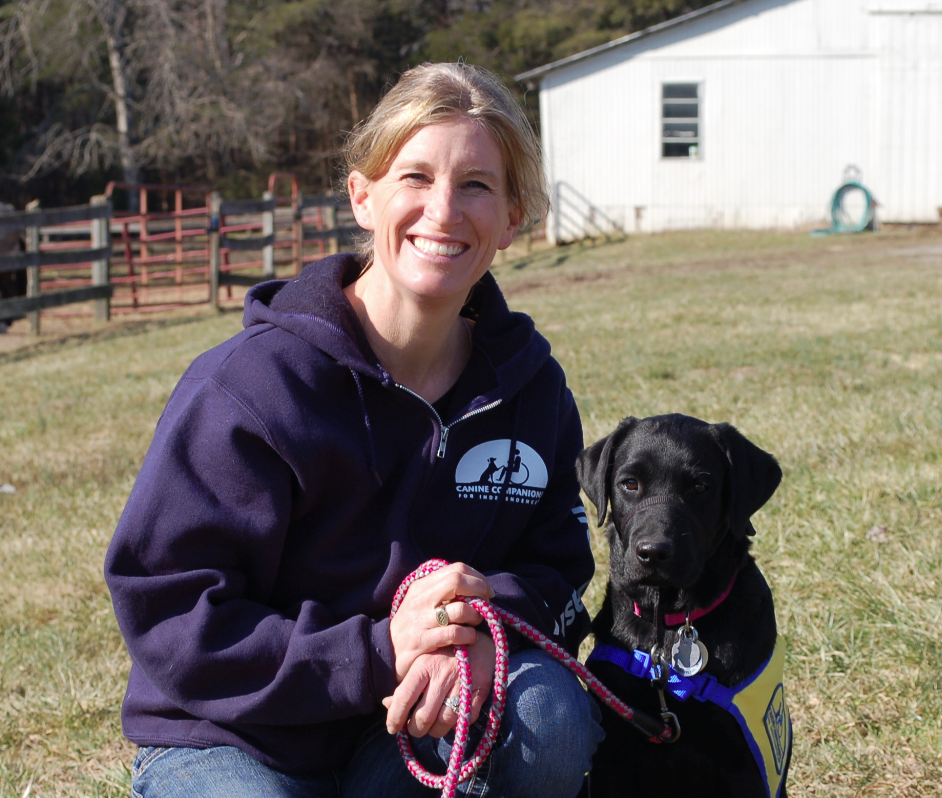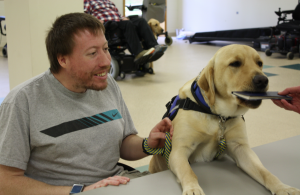‘It’s changed my life,’ dog trainers and those with special needs benefit
Published 11:33 am Thursday, March 10, 2016

- Colleen Roberts, of Cumberland, has been raising dogs for Canine Companions for over 10 years. Lady, her 10th dog, poses with her on her farm.
The raising of labrador and golden retrievers for those with special needs has changed Colleen Roberts’ life.
Raising 10 puppies to become service dogs has greatly improved the lives of many who struggle with small everyday tasks.
Because of Roberts’ dedication and loyalty to the four-legged animals, many people, such as Christopher McGarry, can have a lifestyle that allows for less anxiety and more freedom.
“I started raising for Canine Companions in 2002, 2003 maybe,” said Roberts, who raises and trains
puppies for the non-profit. “And I am a horse trainer and an outdoors person and I adore dogs, they’re my passion. And I’ve always wanted to do it, puppy raise for some organization.”
Roberts and her husband, Richard, moved to Cumberland about five years ago from Northern Virginia.
When Colleen met a friend whose daughter used a companion dog, she learned about the organization.
“It was just amazing talking to her daughter and all the things that the dog could do for her and I just realized I was at the right point in my life to start.”
Roberts is now raising Lady, her 10th puppy, who has high hopes of learning the skills of Twix, a golden retriever, who Roberts raised and now helps McGarry, who lives in Canton, Ma.

Twix, who was raised and trained by Roberts, is now in Massachusetts helping Christopher McGarry with his day-to-day activities.
“He helps me pick things up off the ground,” McGarry said of Twix. “He can carry things for me. He also has the capability of pulling me around whenever I need it. Overall, he just improves my health by relieving some stress, things like that.”
“As a volunteer puppy raiser … we introduce the dogs to 30 basic obedience commands and our most important job is socialization,” Roberts said. “So, we teach these puppies to meet everyone, to be calm in social environments, to pay attention to us, to ignore things like sheep and chickens and distractions. So, really, our biggest job is socialization and self-control.”
Canine Companions raises and breeds the dogs and sends them to volunteer trainers, she said. “They come from California (at) 8-weeks-old to raisers across the country. They’re labrador retrievers or golden retrievers or a cross of the two breeds.”
Lady, a cross, is almost 6 months old.
“Their breeding program has been going on since 1975,” Roberts said.
The training of the puppies starts as soon as they reach their volunteer’s homes.
“You’re teaching them to accept those bits of clothing so you put them on while they’re eating three times a day.”
The teaching includes instructing the dogs to wait for their food and walking on a loose leash next to their master’s sides.
Canine Companions provides volunteer raisers a schedule on when to start certain training, she said.
“You’re always kind of working on commands, incorporating them into your daily life. You start going to a training class immediately.”
Roberts teaches one of the training classes in Richmond.
“We often switch puppies. So, I might take someone else’s puppy for a week and they’ll take mine. I happen to live in the country, so it’s really nice for me to send Lady to somebody who lives in Richmond and can take them on the metro and do things like that.”
She said at 5-6 months old, the puppies are taken into public places, such as stores.
“By the time they’re 18 months, they get turned back into Canine companions for next phase of their lives, which we call college, and they do six months there with professional trainers. And that’s where they learn the really specialized skills, such as turning on and off lights, pulling wheelchairs, opening and closing doors. …”
“It’s a really big to do,” she said of the dogs’ graduating from the basic training to the specialized. “You get to meet the recipient,” she said of the ceremony that’s held for the dogs. “It’s really hard turning the dog in, but, six months later, it’s so rewarding.”
“We love it,” she said of the satisfaction of raising puppies to help others. “Dogs are my passion. Horses are by business but dogs are my fun and my passion and to be able to use my knowledge to raise dogs and to have a new puppy in my house every year and then be able to give that to somebody who is so in need … is a really special gift.”
The dogs are free to recipients, Roberts said. No one gets paid for the work in training the dogs.
“She sponsors me 100 percent in everything that I do with these dogs,” Roberts said of
Dr. Elizabeth Hazelgrove of the Cumberland Animal Hospital, “from medications and shots and heartworming and spay and neutering, which is a really big deal, because I could not do this puppy after puppy financially if I didn’t have support from people like Dr. Hazelgrove.”
“I have sort of this amazing community of people that financially help me raise these puppies,” Roberts said.
McGarry, who was born with spina bifida, can’t walk. Twix is his first service dog.
The dog has greatly increased the quality of living for McGarry. Twix can turn on and off lights, open and close doors, retrieve items from counters and can pull a laundry basket, he said.
“They had me go down to Medford, New York for a 10-day training process,” McGarry said. “And there, I not only did hands-on training with Twix, I did a lot of (activities) to understand how a dog actually thinks.”
Roberts said she makes full-color hard-back books, full of photographs of the puppies development, for each recipient.
“This organization is not only full of incredible well bred and great temperament dogs, but it’s full of the most amazing people, from volunteers to staff to recipients. It’s changed my life … It really has been one of the most meaningful things I’ve ever done.”
According to a Canine Companions for Independence spokesperson, the entity is the largest non-profit provider of trained assistance dogs with six regional training centers across the country, and has placed nearly 5,000 assistance dogs.
“Established in 1975, Canine Companions provides highly trained assistance dogs to children, adults and veterans with disabilities and is recognized worldwide for the excellence of its dogs, and the quality and longevity of the matches it makes between people and dogs. There is no charge for the dog, its training and on-going follow-up services. For more information, visit www.cci.org or call 1-800-572-BARK.”




